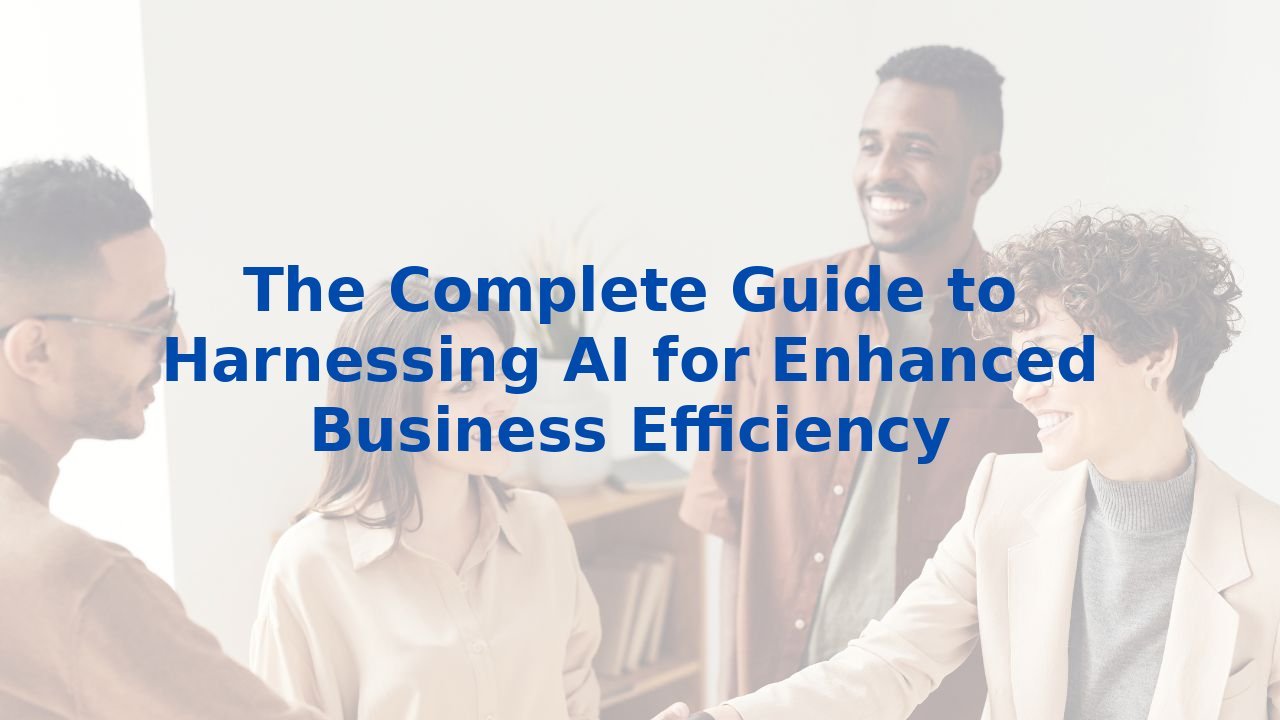The Complete Guide to Harnessing AI for Enhanced Business Efficiency
The Complete Guide to Harnessing AI for Enhanced Business Efficiency
In the relentless pursuit of excellence, today’s organizations face an undeniable truth: efficiency is the heartbeat of sustainable success. Enter Artificial Intelligence (AI)—an unparalleled catalyst for transformation, steering businesses towards remarkable enhancements in productivity and decision-making. This guide dives into how AI can be woven into the fabric of business processes, illuminating the path for organizations ready to embrace a smarter way of working.
Improved Decision-Making
The days of making decisions based on intuition alone are fading. AI introduces an era of informed decision-making, equipped with advanced tools that automate data analysis and extract invaluable insights. Imagine being able to sift through mountains of data in seconds, identifying hidden patterns and trends that would typically slip through the cracks. This is particularly powerful in dynamic sectors like finance, where every second counts. Organizations can evaluate market conditions in real-time, ensuring they capitalize on opportunities while mitigating risks effectively.
Automation of Repetitive Tasks
One of AI's standout benefits is its aptitude for automating mundane, repetitive tasks. By taking on everything from data entry and invoicing to scheduling, AI frees up human potential—allowing employees to pivot towards more strategic, creative endeavors. Automation not only amplifies productivity but also minimizes human errors and cuts operational costs. It's a win-win scenario that liberates your team to focus on what truly matters.
Enhanced Customer Experience
In an era where customer expectations are sky-high, AI stands ready to elevate the customer experience to unprecedented levels. Through the art of personalization and real-time engagement, AI algorithms analyze customer data to tailor products and services to individual needs. Picture a world where AI-powered chatbots are available 24/7, swiftly addressing queries and providing personalized solutions. This shift leads to reduced response times and, ultimately, higher satisfaction levels—turning casual customers into loyal advocates.
Optimized Resource Management
Running a successful business hinges on effective resource management. AI excels in optimizing resource allocation, ensuring that projects are completed on time and within budget. By predicting where resources are needed most, it eliminates inefficiencies and reduces waste. In project management, AI becomes an indispensable ally, enabling businesses to streamline tasks and track progress effortlessly. This proactive approach fosters a culture of accountability and success.
Predictive Analytics and Risk Management
AI's prowess in predictive analytics opens a treasure trove of strategic insights. From forecasting demand and supply to identifying potential risks, AI equips businesses with the foresight required to navigate complexities effortlessly. In industries prone to fraud, such as finance, AI algorithms can recognize atypical transactions, allowing for swift intervention. By predicting challenges before they materialize, organizations embody resilience and agility, fortifying themselves against the ever-evolving market landscape.
Innovation and Cost Reduction
The transformative capabilities of generative AI usher in innovative approaches across various sectors, especially in pharmaceuticals, where it accelerates research and development. By aiding in the design of new drugs and predicting their effectiveness, AI becomes a driving force behind groundbreaking advancements. In manufacturing, predictive maintenance ensures machinery runs smoothly, preventing costly downtimes and optimizing production schedules, thus enhancing overall efficiency and cost-effectiveness.
The Importance of Training Employees for AI
As organizations embrace AI, the importance of training cannot be overstated. Equipping employees to harness AI tools effectively is vital for realizing their full potential. Here are essential components to consider:
- Understanding AI Tools: Employees must gain insight into how AI functions and how it can be seamlessly integrated into their daily workflows, covering aspects like data analytics and automation processes.
- Adapting to New Technologies: Continuous learning is key. Employees need to be agile and prepared to evolve with the tools—embracing new skills for tasks that rely on AI capabilities.
- Ethical Considerations: With great power comes great responsibility. Organizations must ensure that employees are aware of ethical concerns surrounding AI, such as data privacy and the potential for biases, fostering a culture of responsible AI utilization.
Conclusion
Harnessing the capabilities of AI can revolutionize the way businesses operate, streamlining processes, enhancing decision-making, and driving innovation. Organizations that invest in integrating AI across their workflows not only gain a competitive edge but also stand poised for sustainable growth. Moreover, cultivating a workforce well-versed in AI tools is paramount for maximizing these transformative benefits. By embracing AI and committing to continuous education for employees, businesses can transition into a new era of efficiency, creativity, and success.
To learn more about how to equip your entire workforce with AI skills, explore the offerings available at Complete AI Training.



